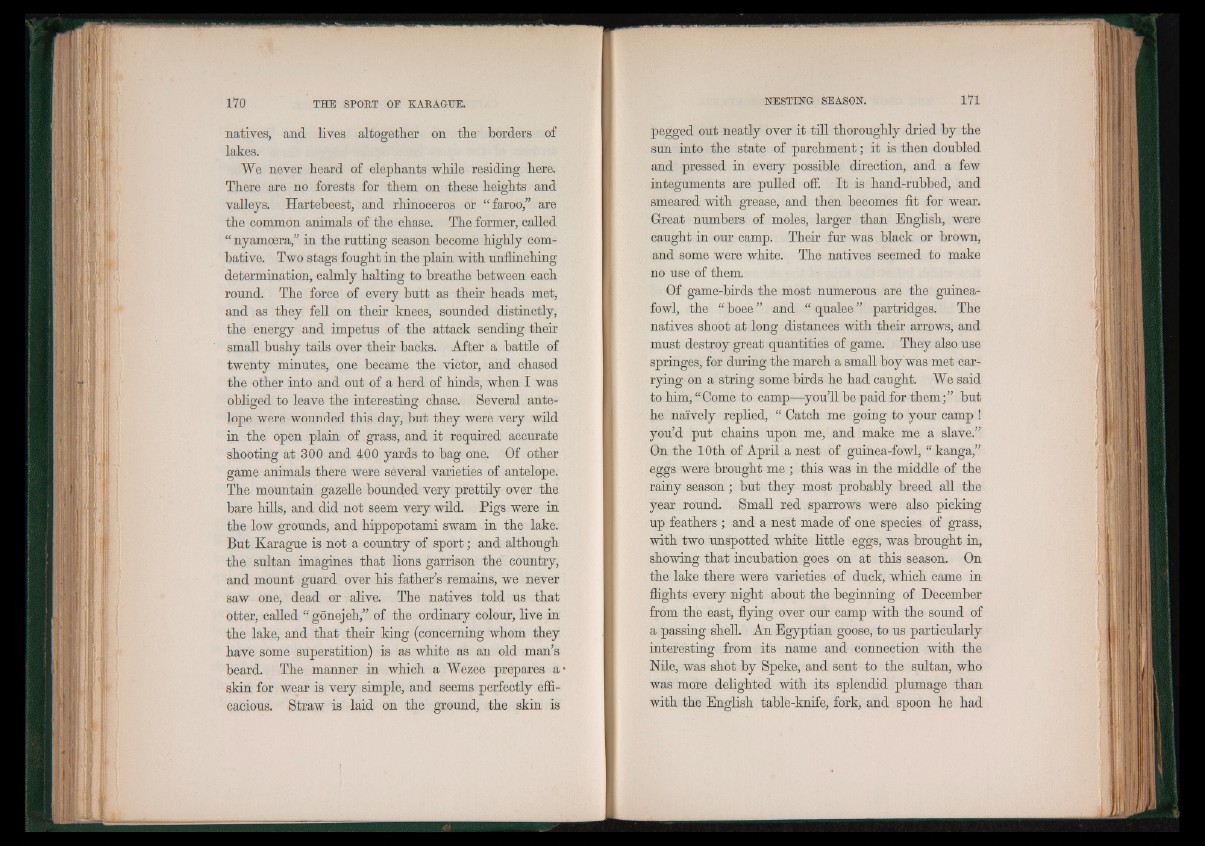
natives, and lives altogether on the' borders of
lakes.
We never heard of elephants while residing here.
There are no forests for them on these heights and
valleys. Hartebeest, and rhinoceros or “ faroo,” are
the common animals of the chase. The former, called
“ nyamoera,” in the rutting season become highly combative.
Two stags fought in the plain with unflinching
determination, calmly halting to breathe between each
round. The force of every butt as their heads met,
and as they fell on their knees, sounded distinctly,
the energy and impetus of the attack sending their
small bushy tails over their hacks. After a battle of
twenty minutes, one became the victor, and chased
the other into and out of a herd of hinds, when I was
obliged to leave the interesting chase. Several antelope
were wounded this day, but they were very wild
in the open plain of grass, and it required accurate
shooting at 300 and 400 yards to bag one. Of other
game animals there were several varieties of antelope.
The mountain gazelle bounded very prettily over the
bare hills, and did not seem very wild. Pigs were in
the low grounds, and hippopotami swam in the lake.
But Karague is not a country of sport; and although
the sultan imagines that lions garrison the country,
and mount guard over his father’s remains, we never
saw one, dead or alive. The natives told us that
otter, called “ gonejeh,” of the ordinary colour, live in
the lake, and that their king (concerning whom they
have some superstition) is as white as an old man’s
heard. The manner in which a Wezee prepares a*
skin for wear is very simple, and seems perfectly efficacious.
Straw is laid on the ground, the skin is
pegged out neatly over it till thoroughly dried by the
sun into the state of parchment; it is then doubled
and pressed in every possible direction, and a few
integuments are pulled off. It is hand-rubbed, and
smeared with grease, and then becomes fit for wear.
Great numbers of moles, larger than English, were
caught in our camp. Their fur was black or brown,
and some were white. The natives seemed to make
no use of them.
Of game-birds the most numerous are the guinea-
fowl, the i boee ” and “ qualee ” partridges. The
natives shoot at long distances with their arrows, and
must destroy great quantities of game. They also use
springes, for during the march a small boy was met carrying
on a string some birds he had caught. We said
to him, “Come to camp—you’ll be paid for them;” but
he naively replied, “ Catch me going to your camp !
you’d put chains upon me, and make me a slave.”
On the 10th of April a nest of guinea-fowl, “ kanga,”
eggs were brought me ; this was in the middle of the
rainy season; but they most probably breed all the
year round. Small red sparrows were also picking
up feathers ; and a nest made of one species of grass,
with two unspotted white little eggs, was brought in,
showing that incubation goes on at this season. On
the lake there were varieties of duck, which came in
flights every night about the beginning of December
from the east, flying over our camp with the sound of
a passing shell. An Egyptian goose, to us particularly
interesting from its name and connection with the
Nile, was shot by Speke, and sent to the sultan, who
was more delighted with its splendid plumage than
with the English table-knife, fork, and spoon he had